12 Best Performance Management Software of 2024

Vishak V
Last Updated: 18 August 2024
13 min read

Revenue in the Enterprise Performance Management Software market is projected to reach US$5.08bn in 2023. Revenue is expected to show an annual growth rate of 4.89%, resulting in a market volume of US$6.45bn by 2028.
And, simplifying employee performance reviews and coordinating staff objectives with corporate goals are two benefits of a smart performance management software solution. Monitoring everyone’s performance when working with a large team (tens or even hundreds of people) takes a lot of time and is difficult to manage and that’s where an performance management software comes in.
We’ve created this article to assist you in choosing from the best performance management software for your company.
What is Performance Management?
“A good performance management system is as important as a good organizational board.”
So, what exactly is Performance Management? And, why do you really need a performance management software? Have questions about performance management software demonstrations? Well, you need to know all of them to strategically align your employees’ work with your organization’s goals.
An essential component of managing staff members in your company is performance management, which involves ongoing feedback and communication. It’s a process that is always changing, with new trends appearing far too frequently every year. Companies today see the value of having strong performance management systems in place since, in the absence of them, workers become disengaged, demotivated, and less productive.
Cons of not having a performance management software in place
- Employees feel aimless after a performance review – because no transparency, no involvement, no growth plans.
- Managers feel frustrated – because they’re unable to provide feedback to the team
- Performance management is an official, strategic and boring procedure the main objective of which is to match the goals of each individual employee with those of the company (in other words, just for the sake of it)
10 Best Performance Management Software of 2024
Here’s a brief description of each performance management software, showing how best to use each, their notable features, and some pros and cons. This performance management tools list is carefully curated to help you choose between the best software for your 360 performance reviews.
1.Thrivesparrow
Best for: All in one employee success suite for Performance Reviews, Employee Engagement Surveys, and Peer Recognition.
Thrivesparrow is an all in one performance management tool that places a lot of emphasis on employee feedback and assessments. It provides an affordable method that incorporates multiple performance evaluation techniques, including 360-degree feedback and recurring performance reviews.
You have a fantastic opportunity to encourage feedback in the workplace, boost open communication, and engage employees with Thrivesparrow.
Features of ThriveSparrow
1. Streamlined Personal Development Planning (PDP): ThriveSparrow automates time-consuming aspects of PDP creation, allowing managers to focus on coaching and development conversations with employees.
2. Competency Insights: Gain a clear view of your team’s strengths and weaknesses across different skills and departments.
3. Self-Discovery and Peer Feedback Reports: Uncover hidden strengths and areas for improvement through a combination of self-evaluation and peer feedback reports.
4. Real-Time Performance Analytics: Make data-driven decisions and optimize workflows with access to up-to-date performance management information.
5. Engagement Visualizations: Easily identify trends and areas for improvement in employee engagement through color-coded heatmaps that categorize engagement levels across departments, managers, and various survey factors.
Explore Deeper Customer Insights with SurveySparrow
Try it for Free!
14-Day-Free Trial • Cancel Anytime • No Credit Card Required •
Pricing
ThriveSparrow offers a modular pricing structure, allowing you to choose the features that best suit your needs. Here’s a breakdown of the core modules:
- Engage: Design and schedule surveys to measure and track team and departmental engagement. Starts at $3/month/employee.
- Kudos: Build a culture of appreciation by enabling peer-to-peer recognition. Starts at $2/month/employee.
- Performance: Facilitate targeted feedback and support individual growth and development. Starts at $5/month/employee.
Pros: Affordable, encourages open communication, and comprehensive performance evaluation techniques.
Cons: Comparatively new.
Sign up for free here!
14-day free trial • Cancel Anytime • No Credit Card Required • No Strings Attached
2.Workday
Best for: Unified HR and performance management solution.
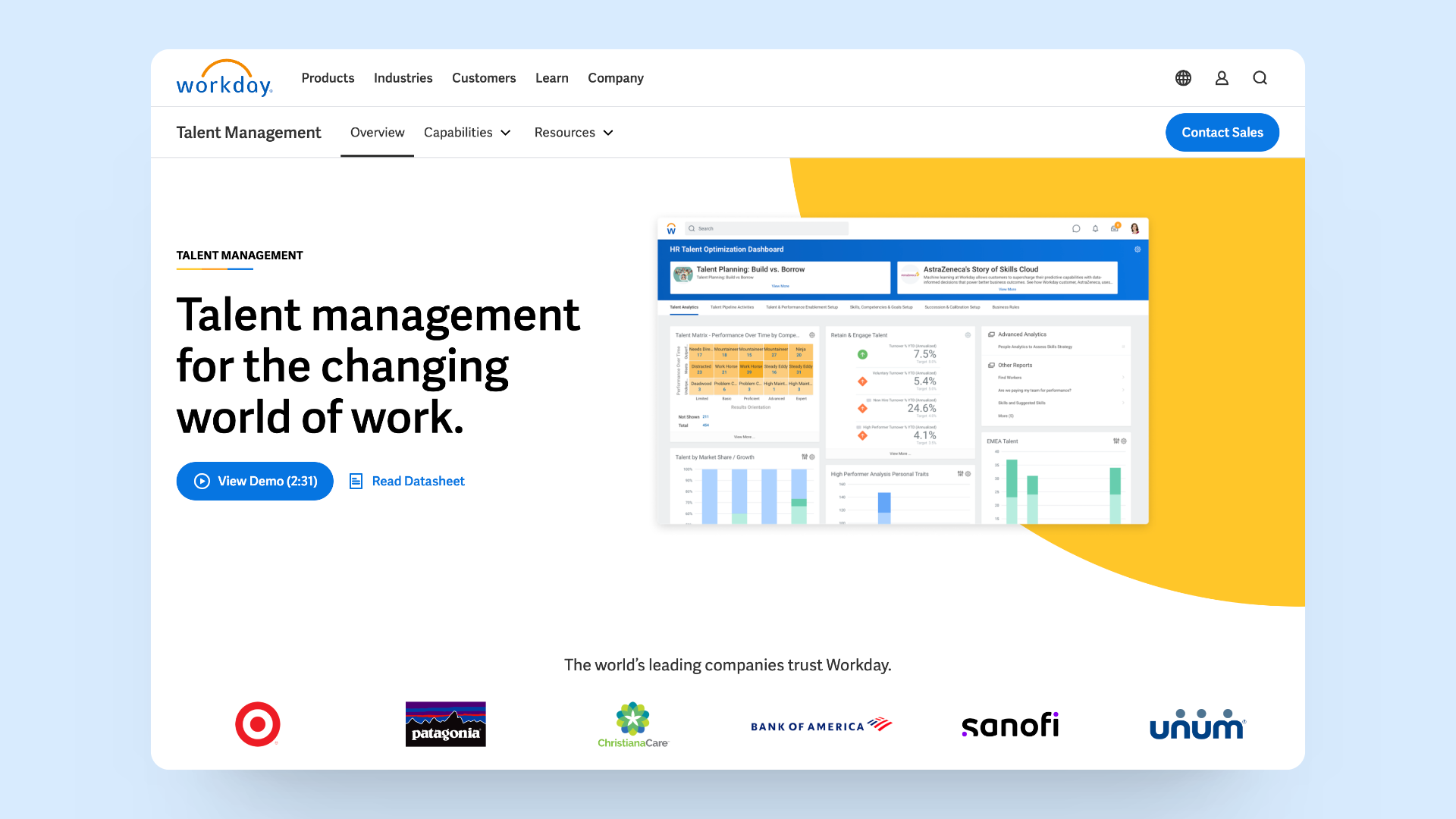
A single system that encompasses solutions for finance, payroll, hiring, learning, project management, and more is Workday HCM. Using a machine learning-powered cloud-based solution, you can better understand and utilise the skills of your staff members while also developing future-ready skills. You may offer each employee personalised career assistance, learning recommendations, and recommendations through Workday.
Key Features:
- Unifies solutions for finance, payroll, HR, learning, and project management in one cloud-based system.
- Machine learning-powered insights to understand and utilize employee skills and develop future-ready talent.
- Personalized career coaching, learning recommendations, and skill suggestions for each employee.
Pros: Comprehensive, powerful analytics, future-focused approach to talent development.
Cons: Might be complex for smaller businesses, potentially high cost.
3. Lattice
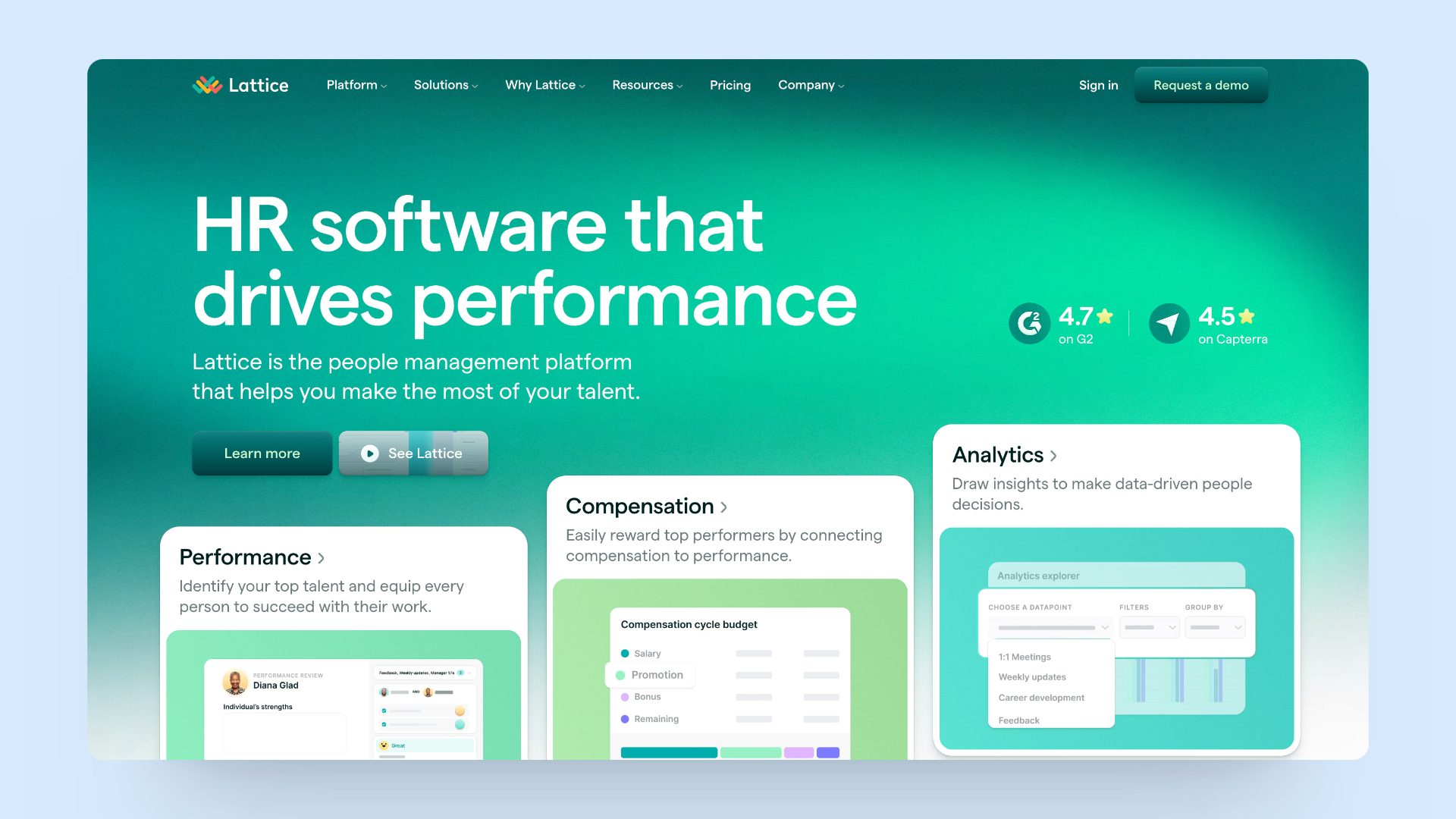
With the help of Lattice’s human analytics framework, managers and HR specialists can see their company more fully and decide on more profitable course of action.
360-degree evaluations can be started, objectives and OKRs can be set, feedback and public recognition can be shared, experts’ best practises can be learned, strong 1:1 relationships can be facilitated with collaborative agendas and action items, the most crucial tasks can be prioritised, and barriers can be overcome with creativity.
Key Features
- Human analytics framework for comprehensive organizational insights and informed decision-making.
- 360-degree feedback capabilities for well-rounded performance evaluations.
- Goal setting and OKR management to ensure alignment and track progress.
- Feedback and recognition tools to promote continuous improvement and employee motivation.
- Collaborative tools for effective 1:1 meetings with clear agendas and action items.
- Prioritization tools to help employees focus on the most critical tasks.
Pros: Highly analytical, fosters goal alignment, promotes strong manager-employee relationships.
Cons: Might have a steeper learning curve, potentially higher pricing for larger teams.
4.15Five
Best for: Continuous performance management and boosting employee engagement.
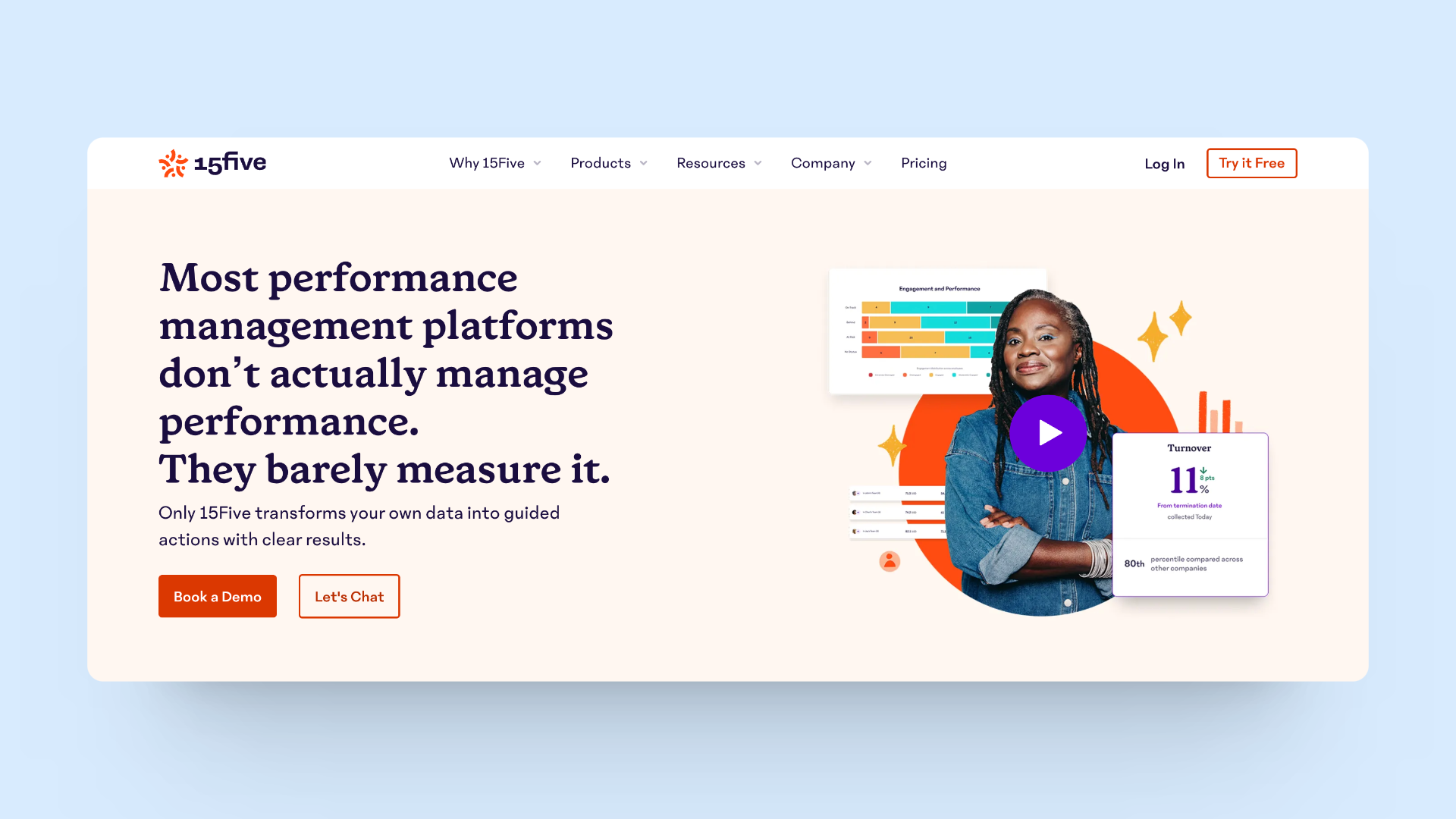
15Five has feedback management, just like the majority of management systems. With this software, your staff members’ engagement will increase. 15Quin keeps the association going strong by asking a lot of questions. Additionally, all of your data and reports are saved by this software.
Key Features:
- Robust feedback management system to encourage ongoing communication.
- Frequent check-ins to maintain engagement and keep teams connected.
- Data and report storage for historical analysis and tracking progress.
Pros: Simple to use, fosters ongoing engagement, data-driven approach.
Cons: May lack some advanced features for complex performance management needs.
5.IntelliHR
Best for: Continuous performance management with a focus on improvement.
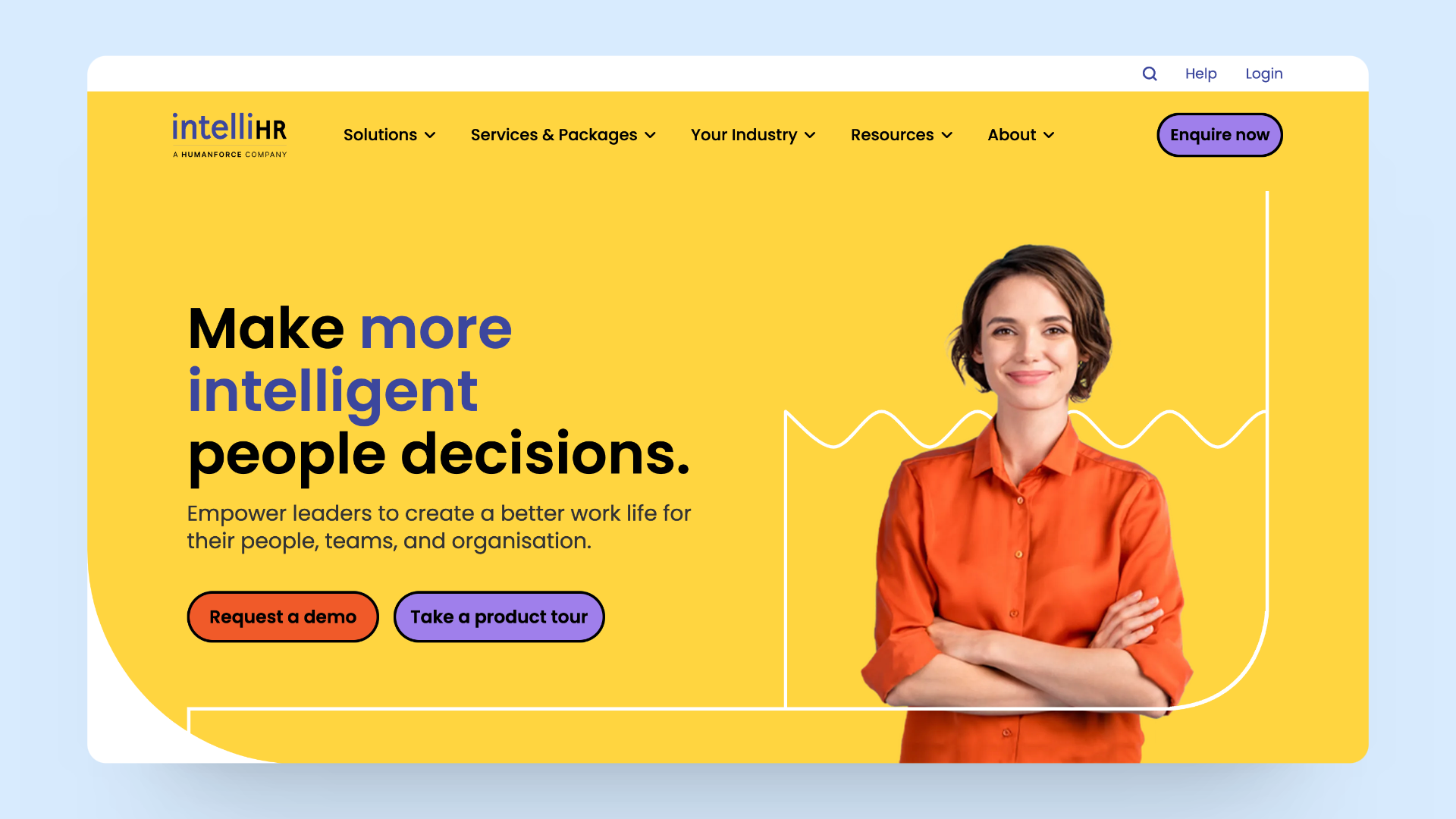
You ought to employ this as your best continual activity. It features an analytics platform that lets you centralise staff performance management. With your improvement strategies, it aids in performance improvement. IntelliHR gathers data on your behalf via registration and feedback.
Key Features:
- Centralized analytics platform for comprehensive performance management data.
- Improvement plan creation and management to guide employee development.
- Automated data collection through onboarding and feedback processes.
Pros: Streamlines data collection, focuses on employee development, ideal for continuous improvement.
Cons: User interface might not be as intuitive as some competitors.
6.Namely
Best for: Streamlining HR processes for small and medium-sized businesses.
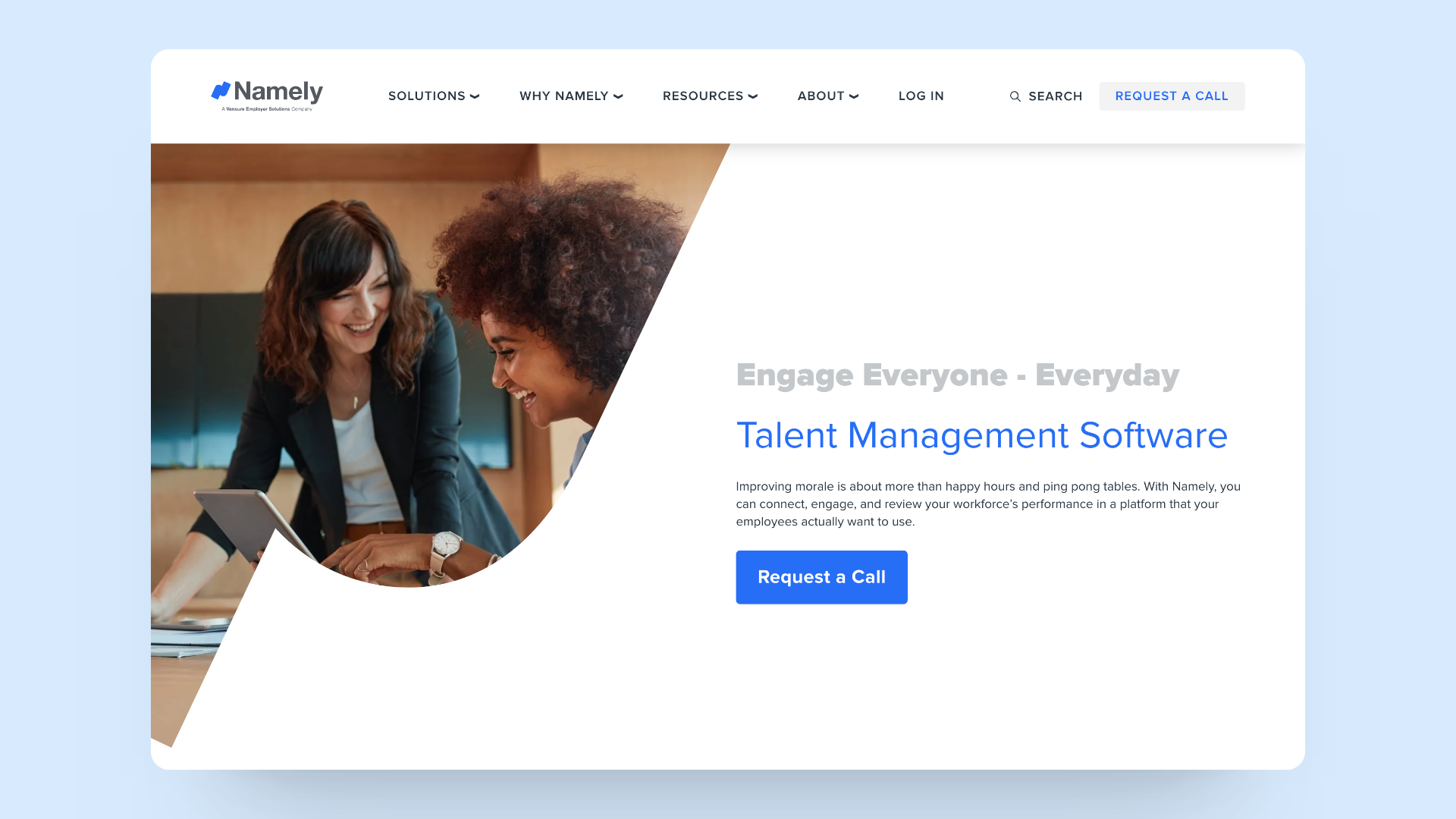
Your company’s HR department is the ideal user for this product. In addition, it provides perks and salary payment upon receipt. You are able to allocate responsibility with this system. Additionally, you ought to use this system for any notices that need to be sent out to the staff. Specifically, there is centralised storage, a calendar, and a workflow.
Key Features:
- Comprehensive HR suite encompassing benefits administration, payroll, and performance management.
- Task delegation and workload management tools.
- Centralized communication platform for announcements and employee updates.
- Built-in calendar and workflow management for improved organization.
Pros: All-in-one HR solution, simplifies communication and task management, ideal for SMBs.
Cons: Performance management features might be less robust compared to dedicated solutions.
7.BambooHR
- Best for: User-friendly performance management for small and medium-sized businesses.
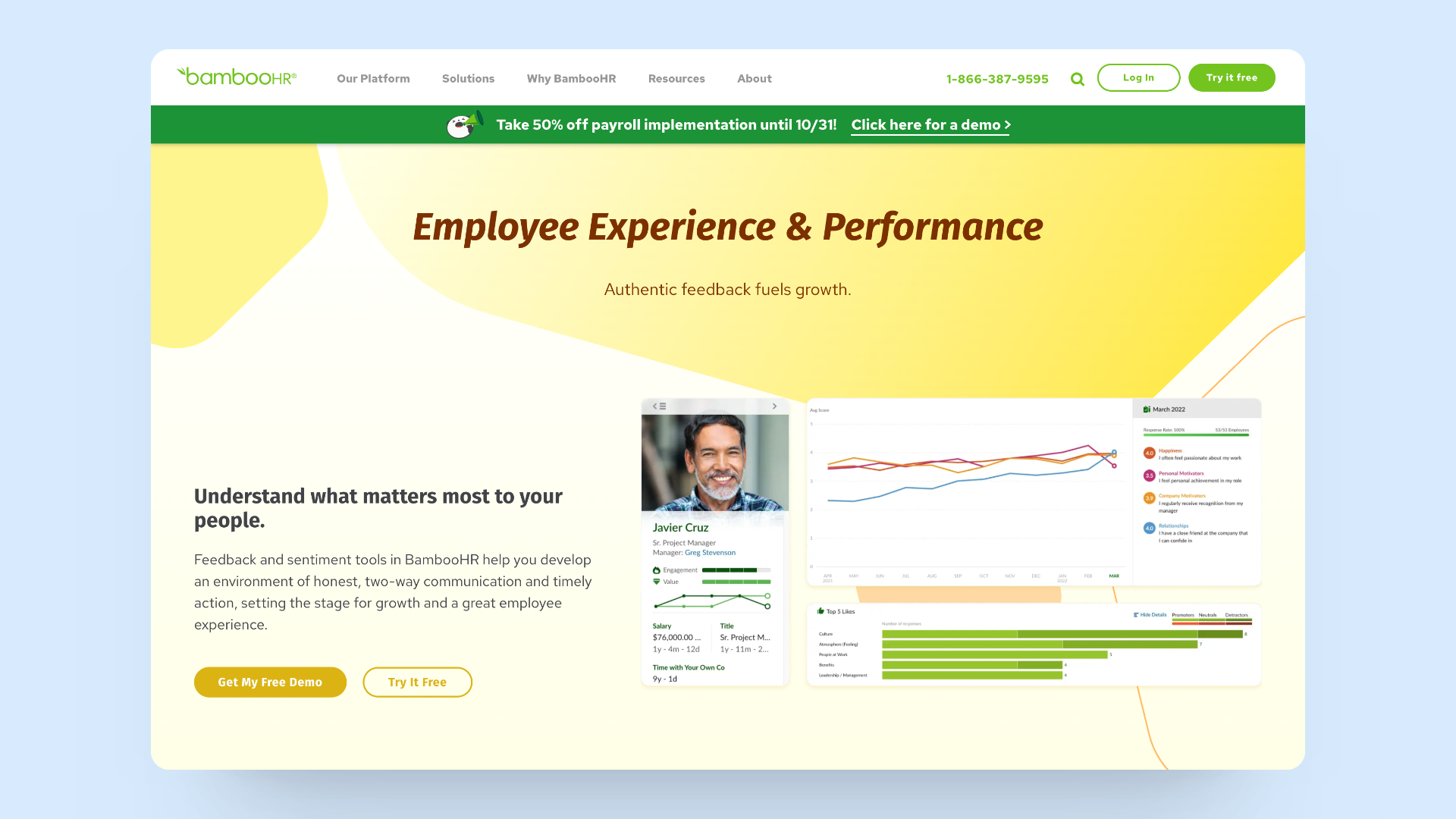
BambooHR is an excellent performance management tool suitable for small and medium-sized enterprises. Its system for evaluating employee performance is made for a redesigned performance management setting with regular check-ins.
Key Features:
- Performance review system designed for regular check-ins and feedback conversations.
- Easy-to-use interface for a smooth performance management experience.
Pros: Affordable, ideal for SMBs, simple to use.
Cons: Limited features compared to more comprehensive solutions.
8.Engagedly
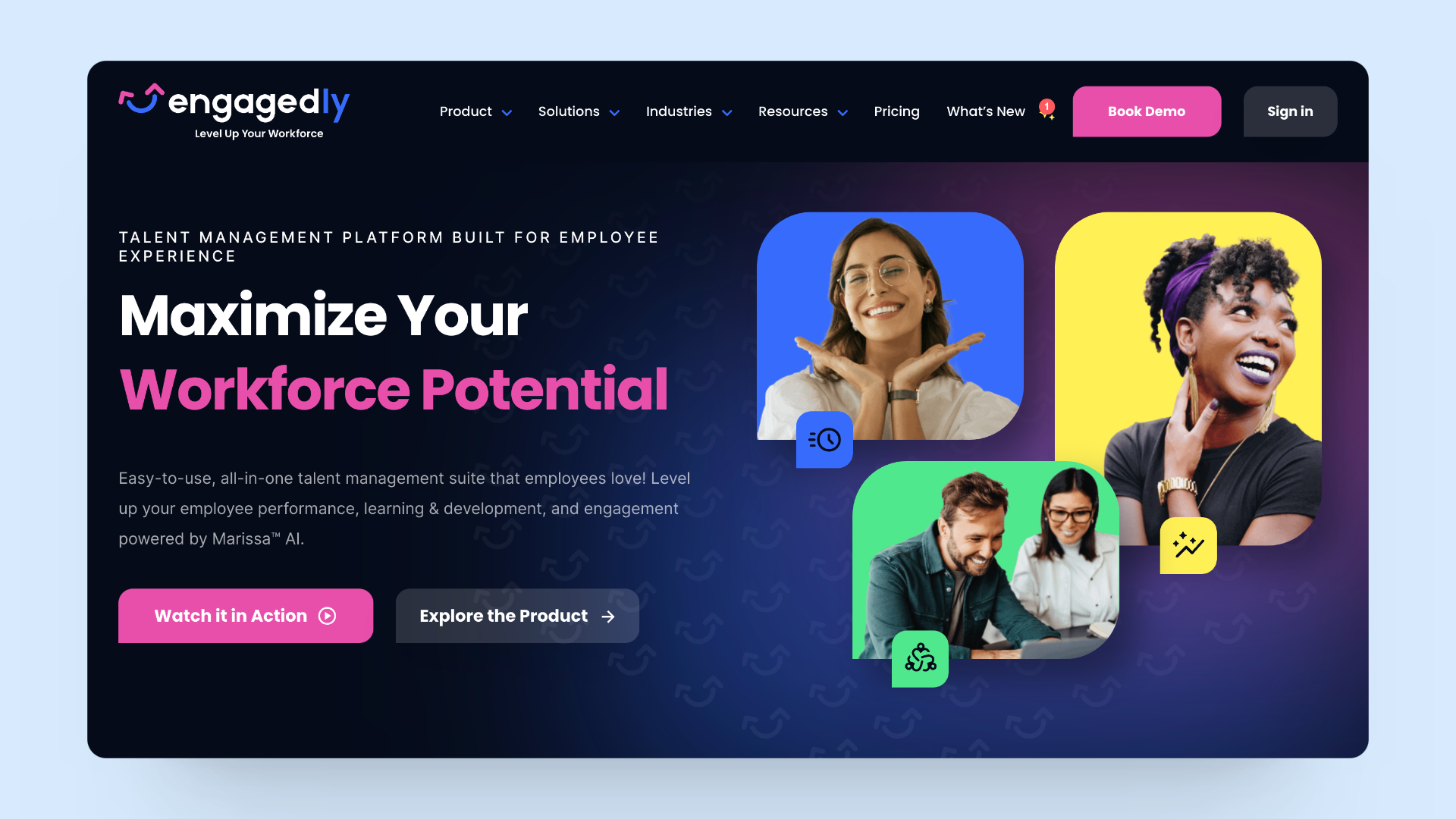
As promised, Engagedly increases employee engagement with a comprehensive approach to performance reviews. With its extensive capabilities, which include social collaboration, goal management and tracking, collaboration, learning platform, surveys, and rewards, it meets every demand an organisation has for performance management.
- Best for: Comprehensive performance management with a strong focus on employee engagement.
- Key Features:
- Social collaboration tools to foster communication and teamwork.
- Goal setting and tracking functionalities to ensure alignment and progress visibility.
- Learning management platform for employee development.
- Employee engagement surveys to identify areas for improvement.
9.Peoplebox
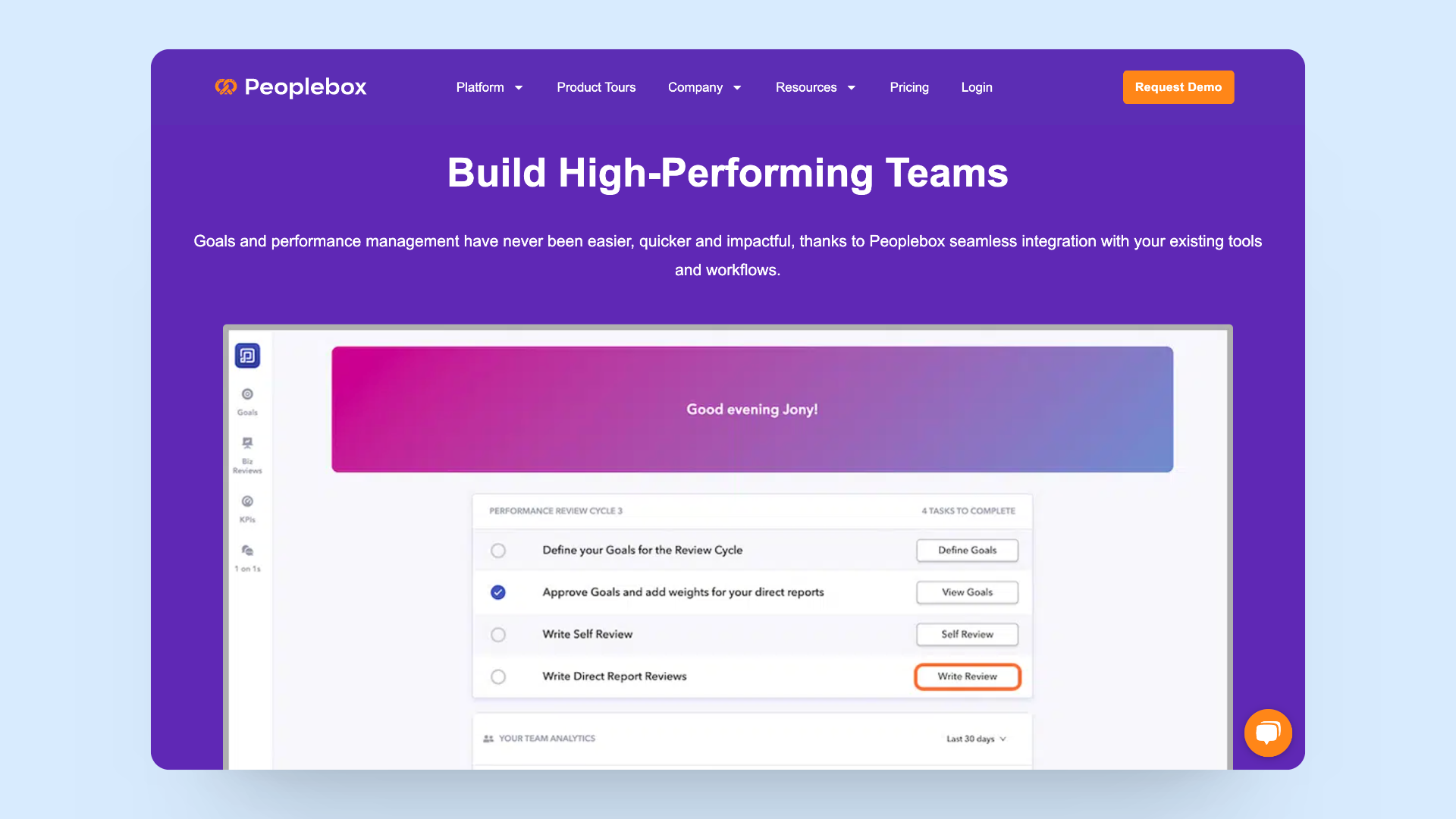
Peoplebox is a platform for performance management whose goals are to create productive teams and accelerate business. It provides you with a comprehensive dashboard and a weekly summary along with automated OKR tracking. Tasks may be synchronised and connected to your goals thanks to its interface with resource management and project management software like JIRA, Google Sheets, and Notion.
- Best for: Aligning teams, tracking goals, and streamlining performance reviews.
- Key Features:
- OKR software with integration to various work tools (Slack, Jira, etc.) for easy goal setting and tracking.
- Automated performance review workflows to save time and improve efficiency.
- Real-time progress updates on goals and objectives for clear visibility.
- Customizable dashboards with charts, KPIs, and progress narratives for insightful reporting.
- Pros: Integrates seamlessly with existing workflows, efficient review process, data-driven decision making.
- Cons: Might lack some advanced features for complex performance management needs.
10. Timely
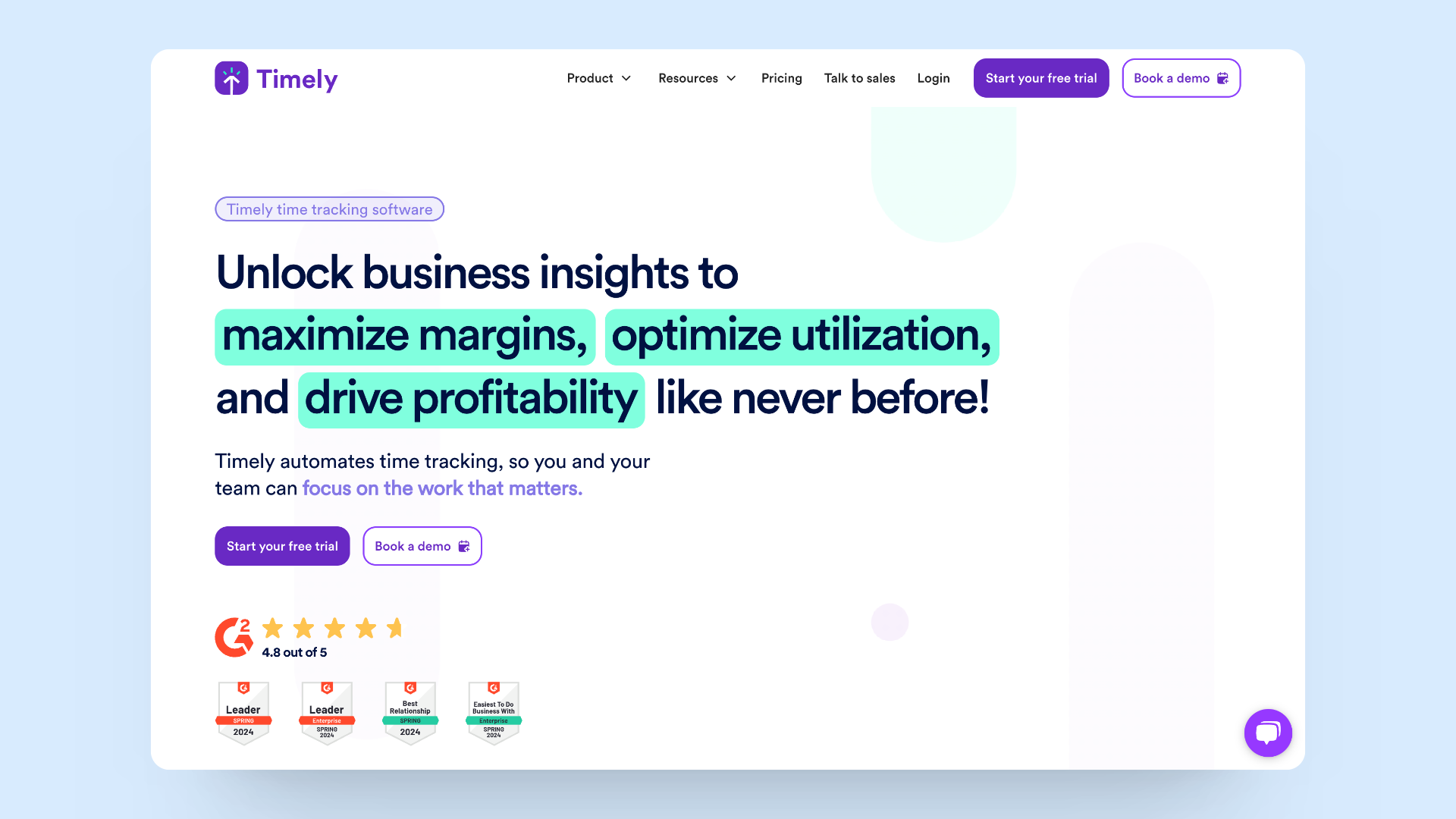
With the goal of streamlining and doing away with task management and time monitoring, Timely is an innovative and user-friendly time management software. Your mobile employees can receive daily reports on all the websites and desktop applications they have visited using Timely. They don’t have to manually record and enter everything because their duties are captured, including emails, papers, video conversations, and virtual meetings.
- Best for: Simplifying time management and streamlining task tracking, particularly for remote teams.
- Key Features:
- Automatic time tracking that captures desktop applications, websites, emails, documents, video calls, and virtual meetings.
- Daily reports on time usage for clear insights into workflow and productivity.
- Mobile access for convenient time tracking on the go.
- Pros: Effortless time tracking, eliminates manual data entry, valuable insights for productivity improvement.
- Cons: Focuses primarily on time tracking, may not offer comprehensive performance management features.
Reasons why you should use performance management software
Workers are able to value who they are
Software for performance management gives workers a sense of voice and empowerment. It seems significant to employees when they are given the chance to voice their thoughts and share their perspectives. Knowing that their contributions and opinions matter to the company can help them perform better.
Better functionality
There is a chance for both the appraiser and the appraisee to voice their opinions. This facilitates the discussion of issues and problem areas. They are aware of the employee’s advantages and disadvantages when given the opportunity to present their case. If employees are aware of the issue areas, having a thorough grasp of them can help them perform better.
Time-saving
You simply need to establish and design policies for entire departments at once when using the software. Rather than having to establish new policies every time, you can quickly assign these policies to individuals depending on their job title, team, or department. Furthermore, you don’t have to design fresh policies for every hire. Simply choose an approach that works for them.
Predictive alerts
You can forget about it once you’ve established a policy and a reminder. Depending on when you are selected to receive notifications, the performance management system will remind you when it wins. With the help of these reminders, you won’t have to remember when the last check was completed or check to see when the next one is due.
Quick response
You can choose distinct timeframes for staff evaluations with the help of an automated reminder. For probationary staff, you may set up a monthly evaluation system, and for permanent staff, a semi-annual feedback period. You have the freedom to choose, therefore not everyone must receive the same yearly report.
Future hold of Performance management software
We’re talking about these performance management systems putting AI and machine learning front and centre. You can bet your bottom dollar that managers and staff are having some really meaningful conversations and making data-driven decisions like never before with 360-degree feedback, constant monitoring, and personalised development plans.
And you know what? Cloud access and collaboration have never been easier thanks to these performance management solutions. Everyone gets to play, regardless of how big of a team you are or how small you are on the world stage. Furthermore, the smooth interaction with other productivity and HR solutions adds even more efficacy and efficiency to the mix.
What does performance management software’s future hold according to you?

Vishak V
Frustrated developer turned joyous writer.
Product Marketer

Turn every feedback into a growth opportunity
14-day free trial • Cancel Anytime • No Credit Card Required •




